In the IT business, the distributor is supposed to be a bridge between vendor and partner. But too often, they become a gatekeeper, blocker, and power broker — turning opportunities into problems and slowing down companies that are ready to grow.
Let’s be blunt: in markets like Armenia, where the number of authorized distributors is limited, many act like monopolies. And that’s dangerous.
Where Distributors Become the Problem
Project Hijacking
You bring in a client, make an offer, start discussions — and suddenly the distributor registers the project under “their favorite” partner. You’re out. No credit, no deal, no respect.
Pricing Games
You get a price that makes you non-competitive, while others receive better discounts. You lose tenders not because your offer is bad — but because the distributor didn’t play fair.
Delays and Bureaucracy
Deal registration, special bids, or discount approvals take weeks. Meanwhile, the client moves on. The speed of your business shouldn’t be dictated by someone else's email queue.
Lack of Transparency
Distributors often know all the vendor rules and programs — but they don’t tell you. Why? Because information is power, and they want to keep that power.
Reputation Risks
When the distributor messes up — delayed delivery, wrong product, unclear communication — it's you who takes the hit with the client, not them.
What Companies Can Do
Go Direct to Vendors
Build strong, direct relationships with your vendors: Oracle, Dell, Fortinet, Palo Alto, Lenovo — they all respect proactive, certified partners.
Diversify Your Channels
Never rely on just one distributor. Always have alternatives — locally or regionally.
Document Everything
Keep records of all communication with clients, distributors, and vendors. If someone tries to “steal” your deal, you have proof.
Register Deals Early
Don’t wait. If you’re involved in a project — register it immediately with the vendor to protect your position.
Enter Tenders Directly
In public procurement, don’t depend on anyone. Go in as a registered vendor partner with your own proposal.
What Vendors Must Do
If vendors don’t watch closely, partners will lose faith. That’s why vendors must:
-
Enforce accountability for their distributors.
-
Protect deal originators — whoever brings the client should own the project.
-
Support partners directly — through deal protection, MDF, price support, and trainings.
-
Make everything transparent — clear rules, public portals, fair conditions.
Final Word
Distributors can be powerful allies — or massive obstacles. It’s up to the vendor to enforce balance, and up to the partner to stand firm and be smart.
At SMMHub LLC, we’ve seen it all. We work directly with major vendors, register our deals, certify our team, and always protect our clients.
If you’ve faced issues with unfair distribution — we can help.




